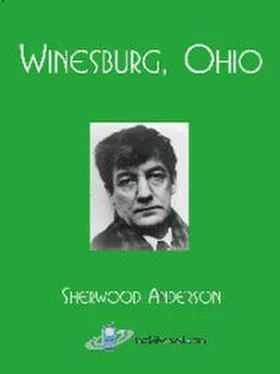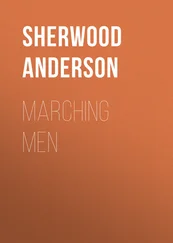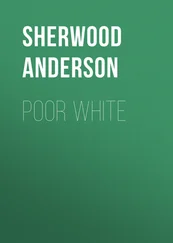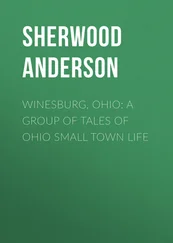Sherwood Anderson - Winesburg, Ohio
Здесь есть возможность читать онлайн «Sherwood Anderson - Winesburg, Ohio» весь текст электронной книги совершенно бесплатно (целиком полную версию без сокращений). В некоторых случаях можно слушать аудио, скачать через торрент в формате fb2 и присутствует краткое содержание. Жанр: Старинная литература, на английском языке. Описание произведения, (предисловие) а так же отзывы посетителей доступны на портале библиотеки ЛибКат.
- Название:Winesburg, Ohio
- Автор:
- Жанр:
- Год:неизвестен
- ISBN:нет данных
- Рейтинг книги:3 / 5. Голосов: 1
-
Избранное:Добавить в избранное
- Отзывы:
-
Ваша оценка:
- 60
- 1
- 2
- 3
- 4
- 5
Winesburg, Ohio: краткое содержание, описание и аннотация
Предлагаем к чтению аннотацию, описание, краткое содержание или предисловие (зависит от того, что написал сам автор книги «Winesburg, Ohio»). Если вы не нашли необходимую информацию о книге — напишите в комментариях, мы постараемся отыскать её.
Winesburg, Ohio — читать онлайн бесплатно полную книгу (весь текст) целиком
Ниже представлен текст книги, разбитый по страницам. Система сохранения места последней прочитанной страницы, позволяет с удобством читать онлайн бесплатно книгу «Winesburg, Ohio», без необходимости каждый раз заново искать на чём Вы остановились. Поставьте закладку, и сможете в любой момент перейти на страницу, на которой закончили чтение.
Интервал:
Закладка:
The young telegraph operator was madly in love. With a kind of religious fervor he had managed to go through the pitfalls of his youth and to remain virginal until after his marriage. He made for George Willard a picture of his life in the house at Columbus, Ohio, with the young wife. "In the garden back of our house we planted vegetables," he said, "you know, peas and corn and such things. We went to Columbus in early March and as soon as the days became warm I went to work in the garden. With a spade I turned up the black ground while she ran about laughing and pretending to be afraid of the worms I uncovered. Late in April came the planting. In the little paths among the seed beds she stood holding a paper bag in her hand. The bag was filled with seeds. A few at a time she handed me the seeds that I might thrust them into the warm, soft ground."
For a moment there was a catch in the voice of the man talking in the darkness. "I loved her," he said. "I don't claim not to be a fool. I love her yet. There in the dusk in the spring evening I crawled along the black ground to her feet and groveled before her. I kissed her sh—s and the ankles above her sh—s. When the hem of her garment touched my face I trembled. When after two years of that life I found she had managed to acquire three other lovers who came regularly to our house when I was away at work, I didn't want to touch them or her. I just sent her home to her mother and said nothing. There was nothing to say. I had four hundred dollars in the bank and I gave her that. I didn't ask her reasons. I didn't say anything. When she had gone I cried like a silly boy. Pretty soon I had a chance to sell the house and I sent that money to her."
Wash Williams and George Willard arose from the pile of railroad ties and walked along the tracks toward town. The operator finished his tale quickly, breathlessly.
"Her mother sent for me," he said. "She wrote me a letter and asked me to come to their house at Dayton. When I got there it was evening about this time."
Wash Williams' voice rose to a half scream. "I sat in the parlor of that house two hours. Her mother took me in there and left me. Their house was stylish. They were what is called respectable people. There were plush chairs and a couch in the room. I was trembling all over. I hated the men I thought had wronged her. I was sick of living alone and wanted her back. The longer I waited the more raw and tender I became. I thought that if she came in and just touched me with her hand I would perhaps faint away. I ached to forgive and forget."
Wash Williams stopped and stood staring at George Willard. The boy's body shook as from a chill. Again the man's voice became soft and low. "She came into the room naked," he went on. "Her mother did that. While I sat there she was taking the girl's clothes off, perhaps coaxing her to do it. First I heard voices at the door that led into a little hallway and then it opened softly. The girl was ashamed and stood perfectly still staring at the floor. The mother didn't come into the room. When she had pushed the girl in through the door she stood in the hallway waiting, hoping we would-well, you see-waiting."
George Willard and the telegraph operator came into the main street of Winesburg. The lights from the store windows lay bright and shining on the sidewalks. People moved about laughing and talking. The young reporter felt ill and weak. In imagination, he also became old and shapeless. "I didn't get the mother killed," said Wash Williams, staring up and down the street. "I struck her once with a chair and then the neighbors came in and took it away. She screamed so loud you see. I won't ever have a chance to kill her now. She died of a fever a month after that happened."
The Thinker
The house in which Seth Richmond of Winesburg lived with his mother had been at one time the show place of the town, but when young Seth lived there its glory had become somewhat dimmed. The huge brick house which Banker White had built on Buckeye Street had overshadowed it. The Richmond place was in a little valley far out at the end of Main Street. Farmers coming into town by a dusty road from the south passed by a grove of walnut trees, skirted the Fair Ground with its high board fence covered with advertisements, and trotted their horses down through the valley past the Richmond place into town. As much of the country north and south of Winesburg was devoted to fruit and berry raising, Seth saw wagon-loads of berry pickers-boys, girls, and women-going to the fields in the morning and returning covered with dust in the evening. The chattering crowd, with their rude jokes cried out from wagon to wagon, sometimes irritated him sharply. He regretted that he also could not laugh boisterously, shout meaningless jokes and make of himself a figure in the endless stream of moving, giggling activity that went up and down the road.
The Richmond house was built of limestone, and, although it was said in the village to have become run down, had in reality grown more beautiful with every passing year. Already time had begun a little to color the stone, lending a golden richness to its surface and in the evening or on dark days touching the shaded places beneath the eaves with wavering patches of browns and blacks.
The house had been built by Seth's grandfather, a stone quarryman, and it, together with the stone quarries on Lake Erie eighteen miles to the north, had been left to his son, Clarence Richmond, Seth's father. Clarence Richmond, a quiet passionate man extraordinarily admired by his neighbors, had been killed in a street fight with the editor of a newspaper in Toledo, Ohio. The fight concerned the publication of Clarence Richmond's name coupled with that of a woman school teacher, and as the dead man had begun the row by firing upon the editor, the effort to punish the slayer was unsuccessful. After the quarryman's death it was found that much of the money left to him had been squandered in speculation and in insecure investments made through the influence of friends.
Left with but a small income, Virginia Richmond had settled down to a retired life in the village and to the raising of her son. Although she had been deeply moved by the death of the husband and father, she did not at all believe the stories concerning him that ran about after his death. To her mind, the sensitive, boyish man whom all had instinctively loved, was but an unfortunate, a being too fine for everyday life. "You'll be hearing all sorts of stories, but you are not to believe what you hear," she said to her son. "He was a good man, full of tenderness for everyone, and should not have tried to be a man of affairs. No matter how much I were to plan and dream of your future, I could not imagine anything better for you than that you turn out as good a man as your father."
Several years after the death of her husband, Virginia Richmond had become alarmed at the growing demands upon her income and had set herself to the task of increasing it. She had learned stenography and through the influence of her husband's friends got the position of court stenographer at the county seat. There she went by train each morning during the sessions of the court, and when no court sat, spent her days working among the rosebushes in her garden. She was a tall, straight figure of a woman with a plain face and a great mass of brown hair.
In the relationship between Seth Richmond and his mother, there was a quality that even at eighteen had begun to color all of his traffic with men. An almost unhealthy respect for the youth kept the mother for the most part silent in his presence. When she did speak sharply to him he had only to look steadily into her eyes to see dawning there the puzzled look he had already noticed in the eyes of others when he looked at them.
The truth was that the son thought with remarkable clearness and the mother did not. She expected from all people certain conventional reactions to life. A boy was your son, you scolded him and he trembled and looked at the floor. When you had scolded enough he wept and all was forgiven. After the weeping and when he had gone to bed, you crept into his room and kissed him.
Читать дальшеИнтервал:
Закладка:
Похожие книги на «Winesburg, Ohio»
Представляем Вашему вниманию похожие книги на «Winesburg, Ohio» списком для выбора. Мы отобрали схожую по названию и смыслу литературу в надежде предоставить читателям больше вариантов отыскать новые, интересные, ещё непрочитанные произведения.
Обсуждение, отзывы о книге «Winesburg, Ohio» и просто собственные мнения читателей. Оставьте ваши комментарии, напишите, что Вы думаете о произведении, его смысле или главных героях. Укажите что конкретно понравилось, а что нет, и почему Вы так считаете.












